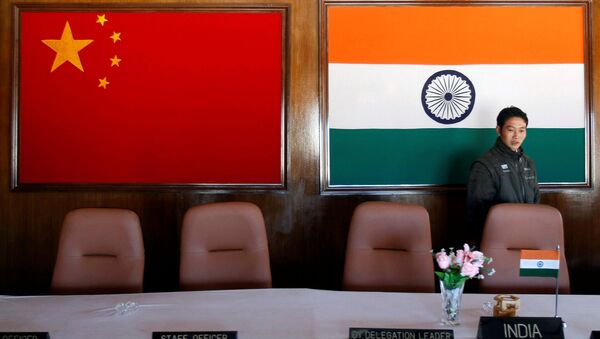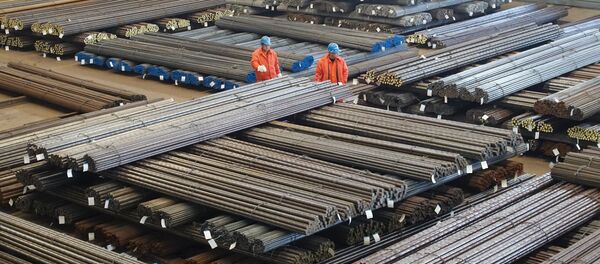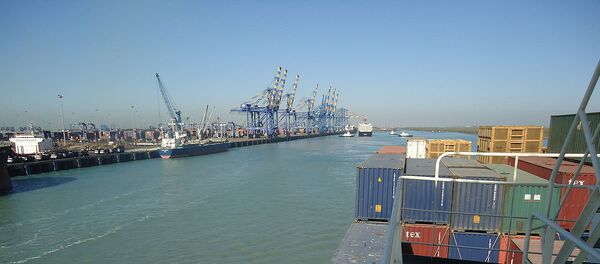New Delhi (Sputnik) — The global business summit called by India's eastern state of West Bengal saw the participation of 30 companies from China, the highest from any country. All of them have reportedly expressed keen interest in the untapped opportunities in the resource-rich Indian state, and the government of West Bengal is hopeful their interest will soon materialize into big investments. However, a question that is plaguing the Chinese side is whether the increasing geopolitical rivalry between the two countries will hamper business prospects.
"There needs to be more communication… Chinese companies need to come to India; Indian companies need to go to China…. It's like match-making, someone might be looking for a wife, someone might be looking for a husband, but if they never meet, it will not happen," Ma Zhanwu told the press during the West Bengal business summit when asked why the quantity of actual Chinese investments kept falling short of targets every year.
Sputnik spoke to Santosh Pai, India — China Investment and Legal Expert, who is also a partner at Link Legal, a law firm with offices throughout India. For his firm, Chinese clients are the growth drivers, and since 2011 Pai has helped about 150 of them gain a foothold in the Indian market.
Sputnik: Since 2014, India and China have had a lot of discussions as well as announcements of Chinese investments in projects across India. Has that been derailed after the Doklam standoff?
Santosh Pai: 2017 was a year when Chinese companies could not invest much overseas because in November 2016, China imposed a slew of restrictions on outbound mergers and acquisitions, amid a wave of foreign deals that fueled capital outflow and exerted downward pressure on the renminbi. Chinese companies could not invest anywhere in the world, not just India.
Having said that, during the Doklam crisis what happened actually was for approximately three months; some of the Chinese companies could not send their senior representatives to India, just for the fact that it does not look good for a country's businessmen to engage in talks with their counterparts in another country when there is political or military tension brewing between the two sides. Apart from that, nothing else went wrong. After the Doklam issue was resolved, the Chinese foreign minister himself came to India and made a statement that Doklam crisis was a minor blip in bilateral relations. So, I would say that Doklam has not impacted Chinese investments in India.
READ MORE: India Needs Chinese Help to Prop-Up Demonetization Drive
Sputnik: Did you witness any kind of resistance from the Indian establishment in giving regulatory clearances to Chinese companies in the recent past, especially during the border stand-off?
Santosh Pai: I do not think so. Now, the Indian government is welcoming all kind of investments, whether it is Chinese, or German or Korean. All the Indian states are vying to attract foreign investments. Of course, there are challenges like the fact that Chinese companies are not familiar with the Indian market, legal process, but there is no purposeful resistance from the Indian government.
Sputnik: Does it mean that politics between countries do not affect investments?
Santosh Pai: Market-driven factors have a much bigger influence in the decision-making process than political hiccups because politics keep changing.
Sputnik: What about regulations? Are business regulations not affected by politics?
Santosh Pai: If you see at the regulations guiding Chinese overseas investments, if you read the guidelines, it becomes very clear that of late, India has gained more favor as an investment destination as compared to its earlier status. This is partly because recent decisions in the US and in Germany almost blocked Chinese investments. The average experience for Chinese companies in India is relatively better today both from their country's regulation perspective and India as a recipient because of the 'Make in India' and other such programs.
Sputnik: In 2014, the Chinese President stated that his country would set up two industrial parks in India. But in the last three years, nothing has been done in that direction. What could be the reason behind this delay?
Santosh Pai: I am not privy to the discussion between the governments. But, from a commercial perspective, this plan has a lot of flaws. I can tell you anecdotally that Indian business environment is considered hostile or difficult to do business with. We have had instances like the burning of foreign factories in the northern state of Haryana by an agitating community demanding reservation for jobs. In this type of environment, Chinese companies would not prefer to set up a hub where a lot of factories will be nestled in a particular location, as doing so would attract a lot of attention. They would find it best to keep a low profile. They would prefer to set up factories where investors from other countries like the US or Germany are already present.
READ MORE: Indo-China Trade War Looms Amid Simmering Border Standoff
Sputnik: The Indian government is in dire need of large investments that can generate a lot of jobs. But as you said, Chinese companies may not be very keen on setting up industrial hubs in India. Does this imply that they will reap the benefits of India's resources but will not provide job opportunities to Indians?
Santosh Pai: I do not think any Chinese company will come and set up a huge factory and employ 10,000 workers from day one. That is a fantasy because neither the market conditions nor the Indian regulatory environment justifies such kind of investment from Chinese companies. When business is good, they might scale it up. When they scale it up they might go to a different location due to reasons like poor logistical infrastructure. That is why the Chinese would prefer small factories at different locations. I think the expectations of large factories employing thousands of people stem from the perception of what happened in China. We tend to think that if Chinese companies come to India they will do exactly what they did in China. Unfortunately, they will only do what would be commercially feasible for them. China has a completely different environment.
The views and opinions expressed by Santosh Pai in this article are those of the speaker and do not necessarily reflect the position of Sputnik.






